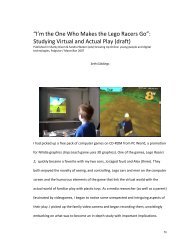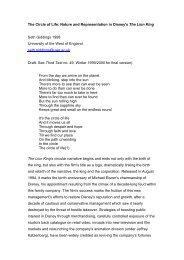Walkthrough: videogames and technocultural form - Seth Giddings
Walkthrough: videogames and technocultural form - Seth Giddings
Walkthrough: videogames and technocultural form - Seth Giddings
You also want an ePaper? Increase the reach of your titles
YUMPU automatically turns print PDFs into web optimized ePapers that Google loves.
The humanist assumptions of constructionism result in clear conceptual distinctions between the<br />
human (from individual identity to human forces such as society, history, <strong>and</strong> economics) <strong>and</strong> the<br />
nonhuman (nature, technology). This project will argue that constructionism limits the underst<strong>and</strong>ing of a<br />
world of material <strong>and</strong> technological, as well as discursive <strong>and</strong> ‘social’, forces <strong>and</strong> agencies.<br />
identity <strong>and</strong> subjectivity<br />
An example of the limitations of social constructionism that is central to this thesis is the fundamental role<br />
played by concepts of (human) identity <strong>and</strong> subjectivity in Cultural <strong>and</strong> Media Studies. So, when Cultural<br />
Studies <strong>and</strong> Media Studies has addressed questions of change <strong>and</strong> newness in media culture it has often<br />
posited human identity <strong>and</strong> subjectivity as the locus of this novelty. From the mechanics of the cinematic<br />
apparatus with the spectator as its human component, or broader questions of the shifting relationships of<br />
individuals <strong>and</strong> groups to their locale <strong>and</strong> the globe through transnational media <strong>and</strong> in<strong>form</strong>ation flows, to<br />
ethnographic studies of the ‘construction’ of identity through Internet media such as MUDs <strong>and</strong> Web home<br />
pages, it is the partially refracted (yet still identifiably humanist) subject that is of concern. As with the<br />
ubiquitous critique of technological determinism outlined above this focus on human identity <strong>and</strong><br />
subjectivity, whatever insights are generated, works to elide consideration of the nonhuman agents in media<br />
consumption <strong>and</strong> communication. This thesis will ask: what are the implications of shifting attention from<br />
subjectivity in media consumption to agency in media <strong>technocultural</strong> circuits?<br />
technoculture<br />
In its general application technoculture refers to cultural phenomena in which technologies or technological<br />
forces are a significant aspect. The essays in Penley <strong>and</strong> Ross’s book Technoculture (1991) for instance cover<br />
medical <strong>and</strong> reproductive technologies <strong>and</strong> discourses, computer hacking <strong>and</strong> viruses, erotic manga, hip hop<br />
music <strong>and</strong> culture, art, <strong>and</strong> (inevitably) Gibson <strong>and</strong> cyberpunk. The term ‘techno-popular culture’ has been<br />
used in ethnographic research on young people <strong>and</strong> computer media (see Facer, Sutherl<strong>and</strong> & Furlong<br />
2003). However it is important to this thesis that any a priori distinction between technology <strong>and</strong> culture<br />
(i.e. as two largely separate phenomena that come together at certain junctures) be questioned. This will be<br />
explored in Part 3.2, but it is worth raising now Bruno Latour’s assertion that society has always been an<br />
indissoluble network of technological <strong>and</strong> human entities (Latour 1991, 1992a, 1992b). A distinction can be<br />
17




